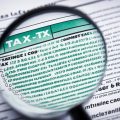Last Updated on: 10th September 2024, 06:54 am
In the UK, your tax code determines how much of your income is tax-free before income tax is deducted. For the 2024/25 tax year, one of the common tax codes that workers and pensioners might encounter is 1271L. Understanding the 1271L tax code is crucial for effectively managing your personal finances and income tax calculations. This article will explain what the 1271L tax code means, how it is calculated, and how it can impact your take-home pay.
What Does the 1271L Tax Code Mean?

In the UK, the 1271L tax code is pivotal for determining the amount of tax-free income you’re entitled to for the 2024/25 tax year. A tax code, such as 1271L, is made up of numbers and letters, each serving a specific purpose.
The number in the tax code reflects the amount of income you can earn tax-free in a given tax year. For the 1271L code, this translates to a Personal Allowance of £12,710.
The letter ‘L’ in the 1271L tax code signifies that you’re entitled to the standard Personal Allowance. This code is typically assigned to individuals with a single source of income and no significant benefits or additional allowances. It indicates that your tax-free income threshold is the standard amount applicable to most taxpayers.
Understanding the 1271L tax code is essential for accurate income tax calculations and effective financial management.
It helps you know your tax-free income limits and any specific circumstances that may affect your personal allowance. Properly managing this code ensures you can optimize your finances and potentially reduce your tax liabilities.
Numbers and Letters in the 1271L Tax Code and Their Meaning
| Code Component | Meaning |
|---|---|
| Numbers | Represent the tax-free personal allowance and untaxed income |
| Letters | Signify the individual’s situation and its impact on the personal allowance |
Changes in Personal Allowance for 2024/25
The Personal Allowance is the amount of income you can earn before you start paying income tax. For the 2024/25 tax year, the allowance is £12,710, slightly higher than the previous year’s £12,570.
This increase slightly raises the amount you can earn without paying tax, which is beneficial for many workers. For those with the 1271L tax code, it means they can enjoy this entire amount tax-free before HMRC deducts any income tax from their earnings.
How HMRC Calculates You 1271L Tax Code?

The 1271L tax code is determined by HMRC based on your tax-free personal allowance and any untaxed income you may have. For the 2024/25 tax year, the tax-free personal allowance is £12,570.
Your tax code reflects this allowance, allowing you to earn up to £12,570 tax-free. In the case of the 1271L tax code, this amount is slightly adjusted to £12,710.
HMRC calculates your tax code by considering several factors. The number in the tax code is multiplied by 10 to determine the amount of tax-free income. For the 1271L tax code, this means you are allowed to earn £12,710 tax-free.
However, if you have additional untaxed income—such as interest on savings accounts or part-time earnings—or if you receive company benefits like a company car or private health insurance, HMRC adjusts your tax code accordingly.
These taxable benefits are added to your income and can reduce your personal allowance, leading to a revised tax code to ensure the correct amount of tax-free income is applied.
The 1271L tax code ensures that your tax-free income threshold is accurately set, taking into account your total income and any benefits you receive. This adjustment process helps in accurate income tax calculations and effective financial management.
The calculation of the 1271L tax code, let’s consider an example:
| Income Source | Amount |
|---|---|
| Salary | £30,000 |
| Untaxed Interest | £500 |
| Company Benefits | £2,000 |
In this example, the individual has a salary of £30,000, £500 of untaxed interest, and £2,000 worth of company benefits. The total income before tax is £32,500 (£30,000 + £500 + £2,000).
Considering the tax-free personal allowance of £12,570, the taxable income for this individual would be £19,930 (£32,500 – £12,570). The 1271L tax code ensures that the individual receives the correct amount of tax-free income, which in this case would be £19,930.
It is important to note that the 1271L tax code may vary depending on individual circumstances and any changes in tax rates or personal allowances. It is recommended to regularly review your tax code and consult with a tax professional for personalized advice.
How to Check and Adjust Your Tax Code?

It’s important to regularly review your tax code to ensure it reflects your current financial situation. You can use HMRC’s online tax code checker to verify if your tax code is correct. If you notice an error or if your circumstances have changed (e.g., starting a new job, receiving additional benefits), you should update HMRC immediately to avoid any issues with underpaid or overpaid taxes.
Here’s how you can review and correct your tax code:
- Visit HMRC’s online portal
- Check your current tax code
- Report any changes, such as new benefits or secondary income
This proactive approach ensures you aren’t caught off guard by a large tax bill later in the year.
Comparison of Common Tax Codes for 2024/25
| Tax Code | Tax-Free Allowance | Description |
|---|---|---|
| 1271L | £12,710 | Standard allowance for most UK taxpayers in 2024/25 |
| BR | £0 | Basic rate applied to second jobs or pensions |
| 0T | £0 | No allowance for those earning over £125,140 |
| D0 | £0 | Higher rate applied to additional income |
| K | £0 | Income from untaxed benefits exceeds allowance |
This table shows how different tax codes apply to UK taxpayers. The 1271L tax code is used by most taxpayers and allows them to benefit from the full Personal Allowance. However, other tax codes, such as BR and 0T, apply when multiple income sources are involved or when your income exceeds certain thresholds.
Benefits of Having a 1271L Tax Code

Having a 1271L tax code offers several advantages to individuals. One of the key benefits is the ability to enjoy a certain amount of tax-free income for the tax year.
This means that individuals can keep more of their hard-earned money without having to pay taxes on that portion of their income. As a result, they have more financial flexibility and disposable income available for other purposes.
With a 1271L tax code, individuals can effectively manage their personal finances by utilizing the tax-free income to cover essential expenses, invest, or save for the future.
This can provide a sense of financial security and stability, allowing individuals to better plan and meet their financial goals.
Additionally, the tax-free income provided by the 1271L tax code can be especially beneficial for individuals with lower incomes or those facing financial challenges.
It helps reduce the tax burden on their earnings, ensuring that they have access to sufficient funds to meet their basic needs and improve their overall quality of life.
Furthermore, the tax advantages associated with the 1271L tax code can be particularly appealing to individuals who are self-employed or have multiple sources of income.
By optimizing their tax code, they can minimize their tax liability and maximize their overall income. This can be especially valuable for freelancers, entrepreneurs, or individuals with side hustles, as it allows them to retain more of their earnings to reinvest in their businesses or support personal growth.
Overall, having a 1271L tax code offers several benefits, including increased tax-free income, enhanced financial management, and improved financial flexibility.
It is important for individuals to understand and make the most of the opportunities provided by this tax code to optimize their financial well-being.
Potential Drawbacks of a 1271L Tax Code

While the 1271L tax code offers benefits by providing a standard personal allowance of £12,710, it also presents certain challenges and potential drawbacks. Understanding these issues is crucial for effective tax management.
One significant drawback of the 1271L tax code is the risk of underpaying taxes. The tax code is based on specific assumptions about your income and allowances, which may not always be accurate.
For instance, if you have additional income from sources such as a second job, investments, or rental properties, the 1271L tax code may not fully account for these earnings. This could result in underpayment of taxes if the code does not reflect the total income you need to declare.
Additionally, the 1271L tax code may not adjust promptly to changes in your personal circumstances. If you experience changes such as receiving new taxable benefits (e.g., a company car or private health insurance), altering marital status, or becoming eligible for new tax credits, these changes might not be immediately reflected in your tax code.
As a result, you could either underpay or overpay your taxes if HMRC has not updated your tax code to account for these changes.
To mitigate these issues, it is essential to regularly review your tax code and personal financial situation. Staying informed about any updates to tax codes and consulting with a tax professional can help ensure that your tax code accurately reflects your current circumstances. By doing so, you can avoid potential discrepancies and ensure that the correct amount of tax is paid.
While the 1271L tax code is generally suitable for many individuals, it may not always accurately reflect your full tax obligations, especially if you have multiple income sources or experience changes in your financial situation. Regular monitoring and timely adjustments are key to managing these potential drawbacks effectively.
Key Points
- Having a 1271L tax code can lead to underpayment of taxes if there are multiple sources of income or changes in personal circumstances during the tax year.
- Additional income from a second job or investments may not be accurately accounted for in the tax code, potentially leading to underpayment.
- Changes in marital status or eligibility for tax credits or benefits can also impact the accuracy of the 1271L tax code.
- Staying updated on tax code changes and consulting with a tax professional can help ensure the correct amount of tax is being paid.
By being aware of the potential drawbacks and taking proactive measures, individuals with a 1271L tax code can mitigate tax implications and effectively manage their tax obligations.
Tips for Maximizing Your Tax Benefits with a 1271L Code

To make the most of the tax benefits provided by the 1271L tax code in the UK, there are several steps individuals can take. By following these tips, individuals can ensure they are maximizing their tax benefits and optimizing their financial position.
1. Keep track of your income
One of the key aspects of maximizing your tax benefits with a 1271L tax code is accurately reporting your income to HMRC. Keep track of all your earnings, including wages, salaries, and any additional income. Make sure to include any taxable benefits you receive as well. By maintaining detailed records of your income, you can ensure that your tax code accurately reflects your financial situation.
2. Take advantage of tax deductions and credits
Another way to maximize your tax benefits is by taking advantage of all available tax deductions and credits. These deductions and credits can help reduce your taxable income, resulting in potential savings. Some common deductions and credits include expenses related to self employment, childcare costs, and charitable donations. Be sure to research and understand the available deductions and credits that apply to your personal situation.
3. Regularly review your tax code
It’s important to regularly review your tax code to ensure it is still relevant and up to date. Changes in personal circumstances or tax regulations can impact your tax code, potentially affecting the amount of tax-free income you are entitled to. By regularly reviewing your tax code, you can ensure that it accurately reflects your current situation and maximize your tax benefits.
4. Seek professional advice if needed
If you’re unsure about how to maximize your tax benefits with a 1271L tax code, it may be beneficial to seek the advice of a tax professional. They can provide expert guidance tailored to your specific circumstances and help you navigate the complexities of the tax system. A tax professional can help ensure that you are making informed decisions and taking advantage of all available tax benefits.
Maximizing your tax benefits with a 1271L tax code is an important aspect of managing your personal finances. By keeping track of your income, taking advantage of tax deductions and credits, regularly reviewing your tax code, and seeking professional advice if needed, you can ensure that you are making the most of the tax benefits available to you.
Common Misconceptions About the 1271L Tax Code

There are several common misconceptions surrounding the 1271L tax code that need to be clarified. Let’s debunk two of these misconceptions:
Misconception 1: Guaranteed Tax-Free Income for Everyone
One prevalent misconception is that having the 1271L tax code guarantees a specific level of tax-free income for every individual. However, this is not the case. The 1271L tax code is based on individual circumstances and can vary from person to person.
It takes into account various factors, such as the individual’s total income, taxable benefits, untaxed income, and any unpaid tax. Hence, the tax-free income under the 1271L tax code is not a fixed amount applicable to all individuals.
Misconception 2: Permanent and Unchanging Tax Code
Another common misconception is that the 1271L tax code will remain the same indefinitely once assigned. However, the truth is that the tax code can be adjusted throughout the tax year based on changes in income, tax rates, and personal allowances.
For example, if an individual’s income increases or tax rates change, their tax code may be modified to reflect the new circumstances. It is crucial to stay aware of any updates or changes in the tax code to ensure compliance with the latest regulations and accurate tax calculations.
By dispelling these misconceptions, individuals can gain a better understanding of how the 1271L tax code operates and how it may impact their tax-free income. It is important to consult with a tax professional or utilize reliable HMRC resources to stay informed about any changes or updates regarding the tax code.
| Common Misconceptions | Clarification |
|---|---|
| Having the 1271L tax code guarantees a fixed tax-free income for everyone. | The tax-free income under the 1271L tax code is based on individual circumstances and can vary. |
| The 1271L tax code remains unchanged once assigned. | The tax code can be adjusted based on changes in income, tax rates, and personal allowances. |
Conclusion
Understanding the 1271L tax code is crucial for individuals in the UK to effectively manage their income tax calculations and personal finances. By familiarising themselves with how the tax code is calculated, comprehending its benefits and drawbacks, and taking proactive steps to maximize tax benefits, individuals can make informed decisions about their taxes and optimize their financial situation.
Staying updated on any changes to the tax code is essential to ensure compliance with HMRC regulations. It is also advisable to consult with a tax professional when needed to receive expert guidance and ensure accurate tax filing. With a solid understanding of the 1271L tax code, individuals can confidently navigate the intricacies of income tax and make the most of their financial resources.
Whether managing personal finances or navigating complex income tax calculations, understanding the 1271L tax code empowers individuals to make informed financial decisions. By staying informed, maximizing tax benefits, and seeking expert advice when necessary, individuals can optimize their tax positions and achieve greater financial security.
FAQs
What is the 1271L tax code?
The 1271L tax code means you’re entitled to a Personal Allowance of £12,710. This is the amount you can earn before paying income tax in the UK.
Why did my tax code change to 1271L?
HMRC may adjust your tax code annually based on the updated Personal Allowance or changes in your personal circumstances, such as changes in benefits or income.
How does the 1271L tax code affect my take-home pay?
Your take-home pay increases because the first £12,710 of your income is tax-free. Any earnings beyond this will be taxed at the standard rates of 20%, 40%, or 45%, depending on your income bracket.
Can I update my tax code if my circumstances change?
Yes, if you experience changes such as starting a new job, receiving additional benefits, or changing your working hours, you should notify HMRC to update your tax code.
What happens if my tax code is incorrect?
If your tax code is incorrect, you might pay too much or too little tax. Contact HMRC to correct it, and they will adjust your payments accordingly.
Is the 1271L tax code permanent?
No, tax codes can change throughout the year based on updates to your income or tax allowances. Regularly check your tax code to ensure it is accurate.
Do tax codes apply to everyone equally?
No, tax codes vary depending on individual circumstances, such as income, benefits, and allowances.




















No Comments
Leave a comment Cancel